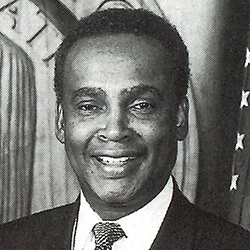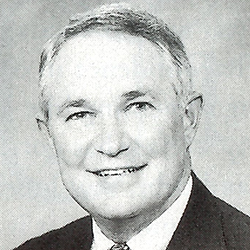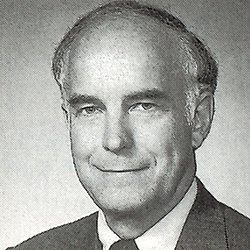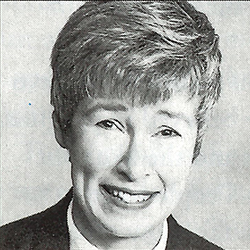Why don’t Americans trust their government?
Nita Rinehart was in the hardware store the other day when the cashier recognized her. “I have stopped voting because I don’t like politics,” the cashier told the state senator from Seattle, “but I will vote for you. I trust you.”
Now there’s something you don’t hear very often: the words “trust” and “politics” in the same sentence. Lately, just about every form of government has been getting ripped more often than Seattle Seahawks owner Ken Behring.
Turn on talk radio, and you’ll hear folks ranting at government leaders for not keeping promises about tax cuts or for turning the home remodeling permit process into a living nightmare.
Feelings of frustration seem to be everywhere. Throw-the-bums-out term limit resolutions and Proposition 13-inspired caps on government spending are all the rage. “Outsiders” like Ross Perot and Pat Buchanan are (to some) the new political hopes for the masses. At the extreme, mistrust in the government has led to such nasty incidents as the Oklahoma City federal building bombing, the Branch Davidian siege near Waco, Texas; and the FBI’s encirclement of the heavily armed “Freemen” in rural Montana.
“Skepticism of the government is a very good thing,” says Walt Williams, a professor of public affairs at the UW and co-founder of the UW’s Trust in Government Project. “But now we have an unhealthy paranoia by people who mistrust the government. And that isn’t going to cure anything.”
While distrust of the government is embedded in our Constitution, with its separation of powers and the division between federal and state governments, distrust today is rated by some experts to be second only to pre-Civil War times.
A 1964 Gallup Poll found that 75 percent of Americans trusted the federal government. Thirty years—after Vietnam, Watergate, Iran-Contra, the House banking scandal—the poll found only 25 percent gave their federal leaders the stamp of approval.
Closer to home, increasing numbers of students at the UW Graduate School of Public Affairs say they prefer careers in non-profit agencies rather than in government. The seething frustration with government leaders is one reason.

Norm Rice
“I think the public is frustrated with government, not that they don’t trust it,” says Norm Rice, ’72, ’74, who has been Seattle’s mayor for the past six years and is currently running for governor. “The frustration is aimed at the government for not fulfilling the public’s hopes and dreams.”
The reasons for this are global and multifaceted, says Rice. He points to the fundamental change in America’s workplace. With employers downsizing, people have to fend for themselves more—and don’t like it. In addition to feeling that government should somehow prevent this from happening, people also feel the government should do more to help them, Rice believes.
“People don’t like knowing their lives aren’t as secure as their parents’ lives,” he says. “We are wrestling with a complex change and people feel government isn’t adapting to the change. So there is anger. People want to see government making the same adjustments they have to make.”

Dan McDonald
Dan McDonald, ’65, ’75, a state senator from Bellevue, has a different point of view. He says a lot of the blame rests with the Democrats, who “legislated by soundbite”—promising what sounded good and compassionate before an election but acting differently afterward.
“That took its toll with the public,” says McDonald. “People know Social Security won’t work forever; the deficit is a scheme that can’t continue, and people are tired of it. They don’t believe government as an institution.”
John Carlson, ’81, a host on conservative Seattle talk radio station KVI, often hears about mistrust from his listeners. “I think people trust the government to do what government ought to do. For instance, when we send our troops to win a war against Saddam Hussein, most people have complete confidence in our government. But when we are doing something like nation-building in Somalia, or the way welfare has gotten out of hand, or exploding deficits and debt, that breeds mistrust. The government has strayed from what it is supposed to do.
“We Americans will figure out that the less you have government involved in things like the anti-poverty business, the better it will be. The government doesn’t solve the problem, it makes it worse. Americans have sensed the limits of government to solve the problems and are trying to deal with them on their own. Welfare reform at the state level is one example.”
And there are other factors, say UW experts, that make people contemptuous of elected leaders: legislative gridlock, negative political campaigning, scandals and the media.
As strange as it may sound, one underlying element in the public’s growing unease has to do with the end of the Cold War. “The crises of the Cold War contributed clarity to the government’s mission as a defender of the people,” says UW History Professor Jim Gregory, whose specialty is 20th century history and politics.
“Americans could always count on one thing—the foreign policy we needed against the Soviet Union. But as the Soviet Union collapsed and our economy had its problems, it created a vacuum of understanding and policy. There was a certain weightlessness to it all. That is the context of our times.”
Scandals like Watergate, Iran-Contra and the Vietnam War also have long-lasting impacts, too. In April, former House Ways and Means Chair Dan Rostenkowski pled guilty to two counts of mail fraud involving converting House funds for personal use. The federal prosecutor in the case noted “the corrosive effect” of Rostenkowski’s misconduct “on our democratic system of government and on the trust our citizens have in their elected officials.”
“Prior to Vietnam, most Americans wanted to believe in institutions,” says Gregory. “They believed in progress, the goodness of government, schools and the like. But now the underpinnings are different. People want to be skeptical, and we don’t take much on faith any more. Even if the public didn’t trust government years ago, they were also much less likely to say so because they didn’t want to come across as being disloyal. Times have really changed.”
And how. Government probably enjoyed its highest standing after World War II. People felt good, the economy was in good shape, the GI bill was putting veterans in school, and low-interest loans helped home buying and businesses get going. But even in the “good old days,” things weren’t at all perfect. While the government was earning high ratings, McCarthyism, racism, sexism, widespread pollution, and other serious societal problems existed.
“We have never had the utopia where everyone trusted government,” says Pat Dobel, associate dean of public affairs. “It isn’t like feelings have suddenly changed. This period is certainly not unique.”
For example, in 1810, a number of extremists in New England talked about seceding from the Union. Then, of course, came the ultimate act of government mistrust—the Civil War. And there have been other fractious times in our nation where civility disappeared because of frustration. For instance, people have been shot, caned and insulted on the Senate floor.
Tmes have changed, especially when it comes to news and information and how it is disseminated.
Information, for example, has become increasingly complex these days, and creates vast amounts of confusion. A great example occurred in February, when the government announced that it had created a large number of jobs, signaling the strength of the economy. The very same day, the Dow Jones average lost 175 points—the third biggest fall in history. Or take the news of the 40,000 layoffs at AT&T. That day, the stock market enjoyed one of its biggest gains ever.
“When one government office says the economy is doing well and the stock market loses, who can you believe?” says Williams. “Many times two government agencies will give conflicting views on the same topic, using the same information.
“This doesn’t help. People don’t know who to trust.”
Thus, the rise of someone like Pat Buchanan. In February, Margaret Gordon, the dean of the Graduate School of Public Affairs, was a guest on a call-in show at conservative Seattle talk radio station KVI. As she sat in the studio in the Tower Building downtown, she was amazed to hear how many callers said they supported Buchanan—even when they didn’t agree with him. They liked him, Gordon says, because he came across as someone who stood up for his beliefs and didn’t waffle on any subject.
“The perception was that politicians changed their views all the time,” says Gordon. “And that people would trust you if you are strong and believable, almost regardless of the specific views you held. I found that very interesting.”
What she finds equally interesting, and depressing, is how the media and role of citizens has changed. A specialist in the role of the media and politics, Gordon says the media is “stuck between a rock and hard place. The media has to make money to survive and is convinced people aren’t interested in serious information.”
The media, she says, has focused on the “horse race” aspect of elections, rather than explaining policies and trends. “It’s all about who wins and loses,” she says. “People turn off. It is a sad situation.”
And the lack of trust in government seems to infiltrate reporters’ work as well. For instance, she points out in a recent study of newspaper stories about urban affairs, mayors were cited as authorities only two percent of the time.
She also cites other examples where newspapers have pulled reporters out of city hall, in essence sacrificing coverage that explains what goes on in city government. Instead these reporters only cover scandals and problems.
Gordon began uncovering these facts and feelings more than two years ago when she got the idea for the Trust in Government Project. Bothered by so many UW public affairs students avoiding careers in government, she and Williams decided to find out why. That quest led to the project, which earlier this year featured four conferences covering different aspects of trust in government.

Dan Evans
The media is one focus of the series. And UW Regent Dan Evans, ’48, ’49, who served as governor of Washington from 1965 to 1977 and U.S. senator from 1983 to 1989, thinks that the media—especially television—has encouraged distrust of government. Too often TV news departments make biased reports and go for the quick, sensational point rather than explaining context or covering an issue in depth, he says.
“The electronic media’s rise in recent years has made a huge impact,” he says. “It tries to cover a complex story in 30 seconds and there is no detail. The sensationalism always seems to be about something bad.
“People have never in history really trusted government, and our government is set up to be that way. People always wonder why government isn’t run like a business but it is designed not to have power concentrated in one place.
“We teach people to distrust government by what we say. Television has told us what stories are important.
“I am a skeptic of this rising tide of mistrust because people are fed it for so long. Talk radio is dependent on outrage or controversy, and it depends on television or newspapers for their story ideas. So they feed on one another.
“And in many issues, like school levies, the press has given equal coverage to a tiny handful of activists. That equal coverage tends to inflate the influence of the minority, and that has an impact on the election.”

Nita Rinehart
Rinehart, a 1990 graduate of the UW law school who was running for governor but dropped out of the race in the summer, thinks local government is where people can connect to their elected leaders, gain some understanding and even trust what is going on.
“The closer you get to the process, the more respect you have for government,” says the state senator. “On the state level, people can get more involved and see how a legislature works, how complex the issues are. In local government, you can have personal relationships with people. We aren’t as removed as people think.” One prime example: polls show that while most people don’t trust Congress, they say they trust their own representative.
But Rinehart, too, comes back to the media as a source for some problems. For example, during recent budget meetings in Olympia, only a handful of reporters attended. Yet she said the meetings produced meaningful discussion of serious issues. On the other hand, when another legislative meeting featured two elected officials known for getting into loud fights, TV cameras couldn’t get in the door fast enough.
“Watergate changed everything,” Evans adds. “It bred a new type of investigative reporter who started out believing something was bad and they were determined to find it. It created combative reporting ever since.”
But others say the media shouldn’t take the brunt of the blame. Dobel, the associate dean for public affairs, says that the media “is an amplifier, not a creator. It tells you where the American people are.”
In his view, the American people are frustrated. It prompts them to embrace term limits and spending limits in an attempt to wrest some control of a system they perceive is out of their reach.
“Limits on terms and spending are big overreactions,” says Dobel, “used by one percent of the political spectrum who don’t care about legitimacy. They only want to limit the power of government. They don’t realize what the government does for them in terms of providing essentials like police, clean water, safe food, building codes and on and on.
“Besides, the way elections have been over the past six years, who needs term limits? People are getting voted out of office after short terms.
“But it isn’t a successful endeavor to convince people of the good government does. The government has a public relations problem because people take it for granted. They don’t see the link of what their tax money goes for.”
What will it take to restore trust in government? McDonald says that Republican strategies like the Contract With America (and those contracts with individual states by their congressional delegations) are critical because it creates more accountability, where people know exactly ahead of time what is promised and what they can expect.
Evans, who served on both the state and federal levels, believes this age of mistrust is just a phase. “It is the cyclical nature of government and people’s beliefs,” he says. “The image of government will indeed change once more and more people realize the thinness of, and the distortion of, the way news is reported. There will be a shift in the way it is reported, and people will listen.
“The same goes for political campaigning. If someone runs a positive campaign and wins, people will say that is the way to go.
“We will never see a time when government is viewed as an enormous good by everyone. There will always be skepticism. And that’s good. But we won’t always have the extraordinary distrust of today.”